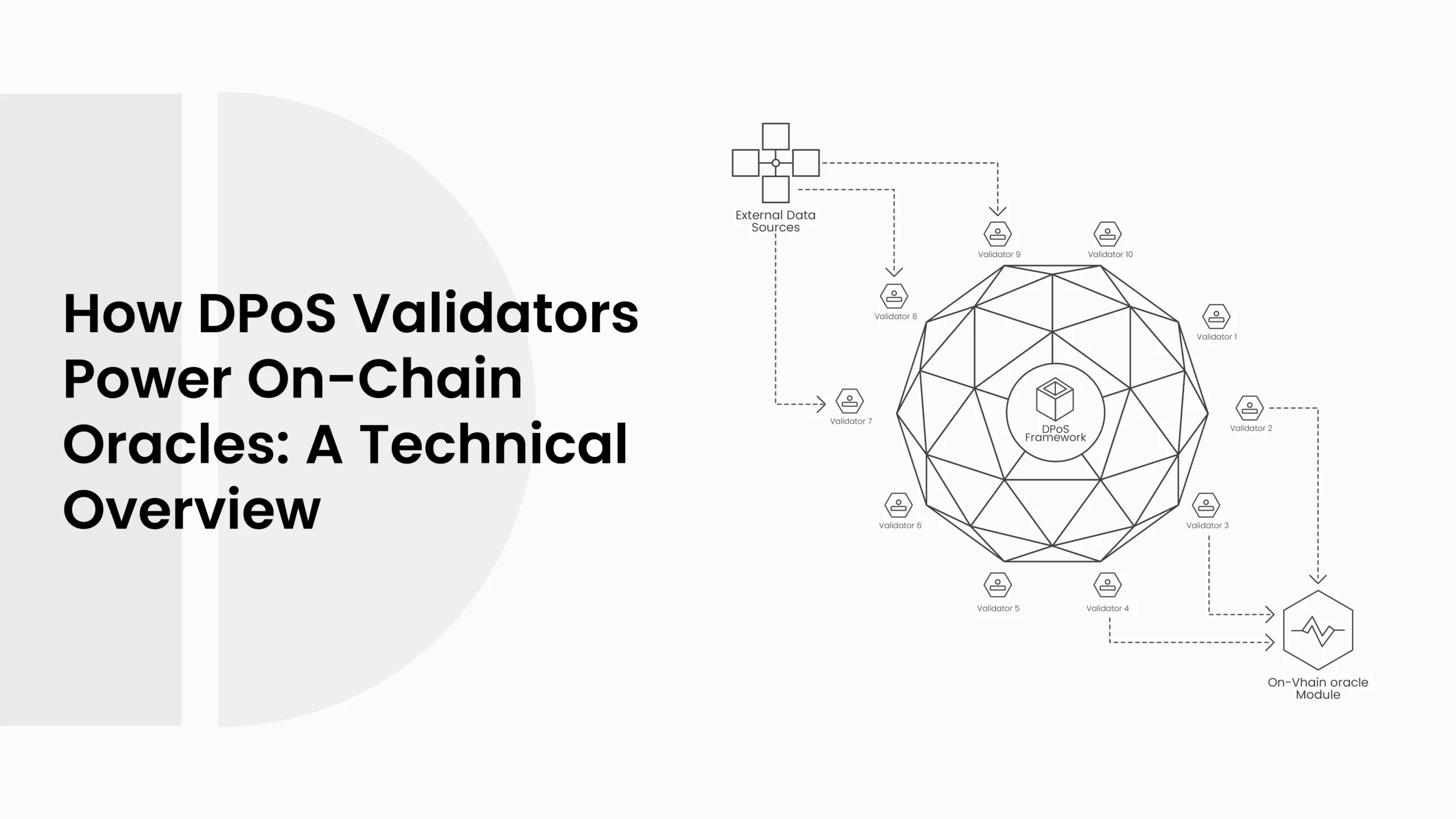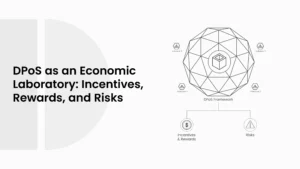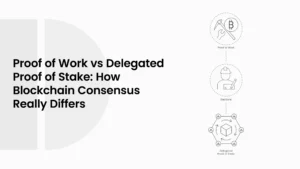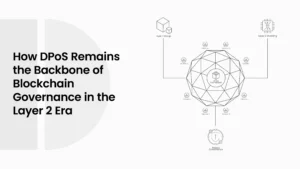How DPoS Validators Power On-Chain Oracles: A Technical Overview

Oracles serve as the connection between blockchain networks and external data sources, allowing smart contracts to act on real-world information. In Delegated Proof of Stake (DPoS) networks, validators do more than secure consensus; they also maintain the integrity of oracle data pipelines. This validator-oracle alignment has become a foundational component in protocols such as Band Protocol and Injective Protocol, both of which run on the Cosmos SDK and Tendermint BFT consensus engine.
- Oracle Architecture in DPoS Networks
- Data Flow Overview
- Internal Oracle Modules (Cosmos SDK)
- Validator Accountability and Data Verification
- Staking and Incentive Alignment
- Cryptographic Proofs and Consensus Validation
- Real-World Implementations
- Band Protocol
- Injective Protocol
- Governance and Reliability Mechanisms
- On-Chain Governance in Oracle Modules
- Validator Accountability and Audit Trails
- Risk Mitigation and Security
- Economic Security: Staking and Slashing
- Data Source Verification and Multi-Source Feeds
- Cryptographic Proofs and Tendermint BFT Finality
- Downtime and Latency Mitigation
- Conclusion: The Merging of Consensus and Oracle Integrity
- Frequently Asked Questions About DPoS Networks and Oracle Architechture
- What role do DPoS validators play in oracle systems?
- How is oracle data verified before being written to the blockchain?
- How do validators remain accountable in oracle modules?
- Glossary
Unlike external oracle networks that depend on off-chain node clusters, DPoS-based oracle modules operate natively within the validator layer. This means the same entities responsible for block production and state validation are also accountable for data retrieval, aggregation, and verification. The result is a more integrated, economically secured, and auditable oracle system that minimizes trust assumptions.
Oracle Architecture in DPoS Networks
Data Flow Overview
In DPoS oracle implementations, validators operate as both consensus agents and oracle executors. The oracle process generally follows these stages:
-
Data Request Initiation:
A smart contract or module broadcasts a request for specific off-chain data (e.g., asset prices, event outcomes).
-
Task Assignment:
The oracle module distributes the request to active validators within the DPoS set. Since validators already stake tokens and maintain uptime, they serve as trusted execution points.
-
Data Retrieval:
Each validator fetches data from pre-approved sources defined by an oracle script, for example, CoinGecko, Binance API, or other market data providers.
-
Verification and Signing:
Validators verify consistency across multiple data points, apply aggregation logic (e.g., median calculation), and sign the resulting value with their cryptographic key.
-
Consensus Aggregation:
Once a quorum is reached, the final data value is confirmed via Tendermint consensus and committed to the chain state.
This flow eliminates dependence on external relayers or third-party oracles, using validator consensus to ensure that data collection, validation, and state updates occur under the same trust framework as block production.
ALSO READ: Can DPoS and Tendermint Work Together for a Faster Blockchain?
Internal Oracle Modules (Cosmos SDK)
On Cosmos SDK-based DPoS chains, oracle operations are integrated through a dedicated module (e.g., x/oracle in BandChain and Injective). Each module defines the logic for Oracle scripts, small programmable data fetchers written in WebAssembly (Band Protocol) or Go (Injective). Validator tasks, data requests, reporting intervals, and gas fees. Aggregation parameters, threshold, voting power weight, and slashing conditions.
For example:
- Band Protocol: Oracle requests are handled through Oracle Data Requests (ODRs). Each ODR includes metadata such as the script ID, parameters, and number of validators required. Validators execute the script, post results, and finalize data through on-chain aggregation.
- Injective Protocol: Validators manage price feeds through the x/oracle module, where they periodically submit off-chain market prices for derivatives and spot markets. The module filters outliers (e.g., >1% deviation) before committing values on-chain.
Validator Accountability and Data Verification
Accountability is central to the DPoS-oracle model. Validators are financially and reputationally tied to their oracle activity through staking, slashing, and governance mechanisms.
Staking and Incentive Alignment
Each validator must stake the native token, BAND on BandChain, INJ on Injective, to participate in oracle reporting. This stake acts as collateral. Validators earn rewards proportional to their reliability and accuracy, while dishonest or inactive ones face penalties.
In Band Protocol, validators who fail to respond to an oracle request within the set block window lose rewards. Submitting incorrect or manipulated data can trigger slashing events, reducing their stake. In Injective Protocol, validators who provide inconsistent price feeds are flagged through the consensus layer, and their submissions are excluded from aggregation. These incentives ensure that validators prioritize data integrity as much as block validation.
Cryptographic Proofs and Consensus Validation
Once validators submit oracle data, every report is:
- Digitally signed with each validator’s private key.
- Weighted by voting power, meaning higher-staked validators have greater influence but can still be overruled by consensus.
- Aggregated under Tendermint BFT, ensuring at least two-thirds of validators must agree on the result before it becomes final.
This architecture guarantees that all oracle data included in the blockchain state carries verifiable proofs and is resilient to manipulation by a minority of dishonest validators.
Real-World Implementations
Band Protocol
Band Protocol operates a dedicated DPoS blockchain known as BandChain, built using the Cosmos SDK for modularity and Tendermint BFT for consensus. On this network, validators perform multiple responsibilities simultaneously. They produce blocks, execute Oracle scripts defined in the x/oracle module, and commit verified data to BandChain’s global state. Each oracle script defines how data should be fetched, aggregated, and validated. When a data request is made, Band’s validator network executes the script concurrently across multiple nodes. The collected data is then aggregated, verified, and transformed into a final oracle proof, a cryptographically signed dataset that can be independently verified by external chains through the Inter-Blockchain Communication (IBC) protocol.
This structure ensures verifiable data provenance. Every oracle result stored on BandChain includes validator signatures, execution timestamps, data source references, and proof of inclusion within consensus. Because of this end-to-end verification, BandChain is regarded as one of the few on-chain oracle frameworks capable of delivering full trust minimization and cross-chain data reliability.
Injective Protocol
Injective Protocol follows a similar design philosophy but focuses on decentralized finance. Built on the Cosmos SDK, Injective uses DPoS validators to maintain both consensus and oracle operations. Its dedicated oracle module, x/oracle, continuously ingests external market data such as trading prices from exchanges like Binance and Coinbase. Validators fetch this data through authenticated API endpoints, sign the retrieved values with their validator keys, and submit them to the network.
Once the data is collected, the system aggregates all submissions using a median function, filters out extreme or inconsistent values, and commits the final verified data to the on-chain oracle store. The stored data feeds directly into Injective’s derivatives and perpetual market modules, providing accurate pricing for trading and liquidation logic.
Validator performance on Injective is tightly linked to their oracle accuracy. Those who maintain low latency and consistent submissions receive proportional rewards, while validators who report incorrect data or miss update intervals face reduced earnings or reputation loss. This alignment between staking, consensus, and oracle reliability ensures that market data remains both timely and tamper-resistant, reinforcing Injective’s position as one of the most technically mature oracle-enabled DPoS networks in operation.
ALSO READ: How Slashing Designs Help Build Trust in Custom DPoS Chains
Governance and Reliability Mechanisms
Governance in DPoS oracle systems plays an essential role in maintaining validator performance and defining how oracle data is sourced, verified, and used. Both BandChain and Injective Protocol integrate on-chain governance mechanisms that determine everything from validator election to oracle module upgrades.
On-Chain Governance in Oracle Modules
In Delegated Proof of Stake (DPoS) frameworks, governance proposals are created and voted on directly by token holders and validators. These proposals determine key operational parameters of the oracle network, including which data sources or APIs are approved for aggregation, how oracle scripts are updated, and what rules govern slashing thresholds or reward distribution. They also define the criteria for introducing new validators or disqualifying those who fail to meet performance standards.
For instance, on BandChain, if a validator is found manipulating data or consistently showing high latency, the community can initiate a governance proposal to penalize or permanently remove that validator. Band Protocol’s oracle scripts, written in WebAssembly, can also be upgraded through the same on-chain governance process, ensuring that data-fetching logic evolves as market conditions or sources change.
Similarly, in Injective Protocol, parameters such as oracle feed intervals, data deviation limits, and data refresh rates are managed through proposals in the network’s x/gov module. This structure enables decentralized control, ensuring that validators remain accountable to both token holders and network rules.
Validator Accountability and Audit Trails
Validator accountability is reinforced through on-chain transparency and cryptographic auditability. Every oracle submission must be signed with the validator’s private key, generating a verifiable record of authenticity.
In Band Protocol, these proofs are embedded directly within the Oracle Result transaction, which includes details such as the validator’s public key signature, timestamp of submission, aggregation script ID, and the block height in which the result was confirmed. This information forms an immutable audit trail that allows any observer or smart contract to verify who submitted which data and when.
Such transparency deters collusion or lazy reporting since every oracle vote is permanently recorded on the blockchain. The ability to trace validator performance and verify oracle history enhances the reliability of the entire network, turning accountability into a measurable and enforceable feature of DPoS-based oracle governance.
Risk Mitigation and Security
Despite high reliability, oracle systems remain potential targets for data manipulation, collusion, and downtime. DPoS validators address these vulnerabilities through economic, cryptographic, and governance-based security layers.
Economic Security: Staking and Slashing
Economic security is enforced through staking models. In Band Protocol, validators stake BAND tokens as collateral. Incorrect or missed oracle submissions can lead to partial slashing. A validator’s influence on the final oracle result is weighted by their voting power, proportional to their stake.
Injective employs a similar staking mechanism with its INJ token, where validators lose rewards or stake if their submissions deviate from consensus or exhibit latency. By tying financial risk directly to validator honesty, the system aligns incentives toward accurate data reporting.
Data Source Verification and Multi-Source Feeds
DPoS oracles typically use multiple external data sources to prevent dependency on a single feed. Band Protocol’s oracle scripts aggregate data from a list of predefined APIs, apply weighting, and discard outliers before committing results. Injective’s module uses a similar filtering rule, excluding submissions that vary beyond a set deviation range from the median value.
This multi-source approach significantly reduces the likelihood of market manipulation, flash loan exploits, or feed tampering affecting DeFi contracts that depend on oracle data.
Cryptographic Proofs and Tendermint BFT Finality
Since both Band and Injective rely on Tendermint’s Byzantine Fault Tolerance (BFT) consensus, oracle submissions must achieve two-thirds validator agreement before being finalized. Once the data is committed to a block, it inherits cryptographic immutability under the same consensus guarantees as transaction data. This ensures that oracle updates cannot be retroactively altered or censored by a small subset of nodes.
Downtime and Latency Mitigation
Validator nodes in DPoS systems are required to maintain high uptime (>95%) to remain in the active set. To prevent oracle feed delays, Band Protocol validators run dedicated oracle relayer services in addition to block producers. Injective validators employ automated scheduling to fetch and relay data at fixed intervals using predefined cron jobs.
Missed updates or downtime result in reward loss, motivating validators to maintain stable infrastructure and low latency networks.
ALSO READ: Debugging Validator Downtime in DPoS Networks: A Beginner’s Guide to Node Stability
Conclusion: The Merging of Consensus and Oracle Integrity
The integration of oracle modules into DPoS validator architecture marks a major step forward in DeFi’s technical reliability. By assigning data-fetching and validation duties directly to elected validators, networks such as Band Protocol and Injective have achieved an economically secure and verifiable oracle model that eliminates dependency on off-chain middlemen.
In this model, validators function as both block producers and data attestors, consensus provides the cryptographic and economic foundation for oracle reliability, and governance ensures continuous accountability and parameter flexibility.
Band Protocol demonstrates this through its cross-chain oracle framework, where oracle proofs can be verified by any IBC-compatible chain. Injective extends the concept further by merging oracles into on-chain financial modules, directly powering spot, derivatives, and real-world asset markets.
This validator-driven approach represents the next evolution of oracle infrastructure, where data integrity is guaranteed by the same mechanisms that secure the blockchain itself. As decentralized finance matures, this alignment between validators and oracles will define how reliable, scalable, and secure the next generation of blockchain-based applications can be.
Frequently Asked Questions About DPoS Networks and Oracle Architechture
What role do DPoS validators play in oracle systems?
In Delegated Proof of Stake (DPoS) networks, validators are responsible for producing blocks and validating transactions, but they also perform oracle duties. They fetch off-chain data (such as price feeds), verify it across multiple sources, sign it cryptographically, and publish it on-chain. This dual role ensures that both consensus and oracle data share the same trust and accountability model.
How is oracle data verified before being written to the blockchain?
Validators independently collect external data from approved APIs or data providers. Each validator signs its submission, and Tendermint’s BFT consensus requires at least two-thirds agreement on the final result. The aggregated and verified value is then stored on-chain.
How do validators remain accountable in oracle modules?
Accountability comes from staking and slashing. Validators must lock native tokens, such as BAND or INJ, as collateral. If they provide false or delayed data, their stake can be partially slashed, or they can be removed from the active validator set by governance vote.
Glossary
DPoS (Delegated Proof of Stake):
A consensus mechanism where token holders elect a limited number of validators who produce blocks, validate transactions, and perform specialized network functions such as oracles.
Validator:
A network participant responsible for maintaining consensus, validating blocks, and, in DPoS oracle systems, collecting and verifying off-chain data.
Oracle:
A module or service that feeds real-world data (like asset prices or event results) into blockchain smart contracts in a secure and verifiable way.
Oracle Script:
In Band Protocol, a programmable instruction written in WebAssembly that defines how validators should fetch and aggregate external data.
Tendermint BFT:
A Byzantine Fault Tolerant consensus engine used in Cosmos SDK networks. It ensures finality once two-thirds of validators agree on a block or data value.
Slashing:
A penalty mechanism that reduces a validator’s staked tokens when they act dishonestly, go offline, or fail to fulfill oracle reporting duties.
Cosmos SDK:
A modular blockchain development framework used by Band Protocol and Injective, allowing custom modules like x/oracle or x/gov to be added.



